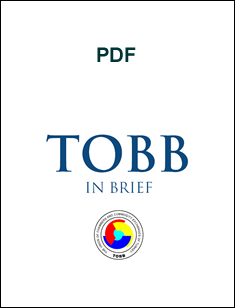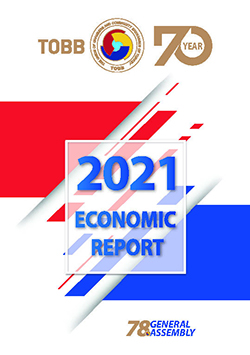TOBB Sector Councils met with the Central Bank

02.08.2022 / ANKARA
The Union of Chambers and Commodity Exchanges of Turkey (TOBB) Sector Councils Consultation Meeting was hosted by TOBB President M. Rifat Hisarcıklıoğlu with the participation of Şahap Kavcıoğlu, Governor of the Central Bank of the Republic of Turkey, and the Presidents and Members of 65 Sector Councils operating within TOBB.
TOBB President Hisarcıklıoğlu, in his opening speech, emphasized that the need for credit for investment and working capital increased compared to past periods due to high inflation and cost increases, and said that taking into account the increasing need for working capital, it is necessary to be sensitive about the side effects of the measures taken and that the banking system should facilitate access to credit.
Hisarcıklıoğlu, stating that they believe that common sense and consultation are important and necessary in the process they are in, said, “In this context, we are bringing together all the sectors in our country here today. In our sector Councils, the 40 largest companies in each sector take place. In addition, in each assembly, there are representatives of public institutions related to that sector. In this way, our sector councils operate as a very important consultation mechanism where the private sector and the public administration come together, consult around the same table, work together, discuss the problems and transfer the agreed proposals to the relevant Ministries.”
Hisarcıklıoğlu said that despite all the difficulties experienced, the Turkish economy has grown much faster than other countries in the recent period, exceeding the pre-pandemic levels in exports, production and employment.
Pointing out that in addition to the increases in inflation and production costs at home, they are also faced with rising raw material and energy prices all over the world, Hisarcıklıoğlu said, “The Russia-Ukraine war, China-Taiwan tension, problems in energy and food supply, the resurgence of Covid-19 and the increase in interest rates around the world affect global growth downwards. For the rest of 2022, a more bleak and more uncertain environment awaits the world. Therefore, in this challenging period that we are facing, ensuring that our companies have access to finance under appropriate conditions is critical for our country's economy.”
Hisarcıklıoğlu stated that access to finance has become difficult in the recent period and that complaints from companies in every province and district have increased in this direction and continued: “The biggest problem is experienced by our small and medium-sized enterprises that need to be considered the most. In addition to the rise in loan rates, it is conveyed that credit limits are narrowed in real terms and there are problems in use.While the Central Bank funding interest rate is 14% and the average interest on deposits is around 20%, it is seen that some banks apply interest between 30% and 50% on commercial loans. Some of them don't give credit at all.”
Emphasizing that another problem is loan maturities, the TOBB President said: “It is becoming increasingly difficult to find long-term and fixed-rate loans required for investments. On the other hand, complaints about the decrease in Central Bank rediscount loan disbursements, which is a very important opportunity for our exporters, are also increasing. The desire of the real sector is for stability to prevail in the credit markets. Because every company that invests, exports and provides employment in our country is our national value and needs to be protected.
On the other hand, due to high inflation and cost increases, the need for credit for investment and working capital has increased even more than in previous periods. Working capital loans have become critical for SMEs in particular to continue their activities. Therefore, taking into account the increasing need for working capital, it is necessary to be sensitive about the side effects of the measures taken and to facilitate access to credit in the banking system.
Our banks are also expected to provide loans to our real sector on favorable terms and to act constructively, taking into account the funding costs. Thus, our real sector will continue to make the maximum contribution to investment, production, exports and employment by overcoming all manner of negative conditions with the least damage. I hope that today's meeting will be an important opportunity to better understand each other mutually, especially to reduce the difficulties experienced in accessing loans.”
- CBRT Governor Kavcıoğlu
The Central Bank of the Republic of Turkey (CBRT) Governor Şahap Kavcıoğlu pointed out that the increasing geopolitical risks in the nearby region, which started with the Covid-19 outbreak, and the increasing energy problems, supply constraints and disruptions in the supply chain led to negative reflections on a global scale.
However, energy and commodity prices, especially in the supply times of developing countries, have improved somewhat recently, Kavcıoğlu said, adding that due to these developments, they have seen that the pressures accumulated on production costs have gradually decreased.
Pointing out that net exports and machinery-equipment investments played an important role in strong growth, Kavcıoğlu emphasized that net exports contributed positively to growth for the last 5 quarters consecutively when the components of growth were examined.
Kavcıoğlu pointed out that machinery and equipment investments continue in a healthy and sustainable framework and that these investments indicate a stable and strong growth.
Stating that many countries could not compensate for the losses in labor force participation during the pandemic period, Kavcıoğlu said, “On the other hand, the fact that labor force participation and employment indicators have risen above pre-pandemic levels shows the vitality and robustness of labor markets in the normalization process.”
Pointing out that the role played by the Central Bank in supporting investment, employment, production and exports in the recent period has been dramatically revealed by the loans used by the companies, Kavcıoğlu said that in the first 6 months of 2021, the net disbursement of TL loans increased from 75.6 billion to 820 billion TL in the same period of 2022, which was a significant increase.
Kavcıoğlu pointed out that the growth rate of the disbursement of all loans, including foreign currency, in the first half of 2021-2022 was close to 500%, adjusted for exchange rate effects, and shared the following information: “The loans provided in the first half of 2022 reached almost 3 times the entire year of 2021. SME loans amounted to 372.8 billion liras in the first 6 months of the year, well above the 27.3 billion liras in the same period of 2021. In this period when the loans provided showed a record increase, access to credit was strong and widespread enough to be reflected in the number of companies using credit. Between December 2021 and June 2022, the number of companies granted loans reached approximately 2 million from 1,878,000 in total. The number of SMEs using credit increased by 195,000, reaching 2,056,000.”
Your message has been sent
Thank you |




